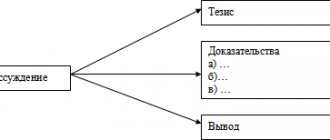Work program of the elective course “From Word to Text”
EXPLANATION .
The program of the elective course in the Russian language “From Word to Text” involves text analysis, in-depth study of syntax for creating text, and argumentative essays for 11th grade as a supplement to the basic course.
The program includes theoretical material, as well as practical questions and assignments. Practical work under this program is carried out for: 1) the development of free and imaginative written and oral speech of students ;
2) developing students’ skills in working on complex syntactic structures and creating text - essays.
Goals :
— develop the speech-thinking abilities of students;
— promote in-depth study of syntax and, on its basis, the growth of the student’s speech culture;
— develop skills of independent analytical work with text;
- develop the ability to quickly navigate the text;
- highlight syntactic constructions, master syntactic relationships between words;
- develop skills in using words and phrases in speech;
— determine structural and semantic differences between one-part and two-part sentences;
- identify shades of similar constructions during synonymous replacement;
— eliminate stylistic errors and grammatical errors;
- use different types of appeals;
— when studying complex sentences, focus students’ attention on how substitution affects the meaning of the statement and the emotional coloring of speech
- prepare students for editing and composing coherent texts - essays of different genres;
- to form the need to express your thoughts, feelings, beliefs.
The elective course “From Word to Text” creates conditions for the development of punctuation and speech skills, for the development of students’ creative abilities, and the formation of functional literacy.
I would like to draw your attention to the fact that a number of topics overlap with the topics of the basic Russian language program for secondary (complete) general education and specialized ones, but these topics in this program are more complicated.
The work program is designed for 34 hours ( 1 hour per week, for two groups: basic and specialized level ). This program will help you complete different-level versions of exam tasks, using possible action algorithms, and will allow you to acquire the skills to take tests of any complexity, create essays and reasoning, and effectively prepare for the Unified State Exam.
The entire practical part of the elective course is represented by exercises and tasks of increased difficulty, but there is also an entertaining character.
The proposed system of tasks outlines the solution to the following problems:
- generalization, systematization of knowledge about the sentence as a unit of syntax at a higher level;
— expansion and deepening of knowledge of syntax;
- development of intonation-expressive speech;
- independent use of certain syntactic structures not only in a separate statement, but in the creation of texts of a linguistic nature;
— development of logical and abstract thinking;
- developing the skills to create your own text - an essay (reasoning) using arguments to prove your point of view on a particular issue;
— fostering respect for the Russian language, a conscious attitude towards it as a cultural phenomenon.
As a result of studying this elective course, students should be able to:
— possess the skills of text analysis (determining the main idea of the text, the author’s position, its problems);
- possess the skills of syntactic parsing of sentences of any structure;
- determine the type of connection in a subordinating phrase;
- independently construct one or another syntactic-stylistic structure of a sentence and use it in one’s own speech;
- create a text-reasoning that corresponds to the student’s personal ideas on this issue;
- possess the skills of stylistic text editing;
- possess punctuation skills in sentences with words and structures;
- use synonymous variants of expressing the same thought.
| p/p | Calendar and thematic planning in the Russian language. Grade 11. Topic of the lesson. | Qty hours | Deadlines check Denia | |||||
| 1-2. | Text. Its structure. Text analysis. Syntax and punctuation. Generalizing repetition | 2 | ||||||
| 3. | Syntactic norms (constructing a sentence with a gerund) | 1 | ||||||
| 4. | Approval standards. Construction of sentences with homogeneous members and SPP. | 1 | ||||||
| 5. | Text. Means of connecting sentences in the text. | 1 | ||||||
| 6. | Offer. The grammatical basis of the sentence. Subject and predicate. | 1. | ||||||
| 7. | Syntactic analysis of sentences (generalization). | 1 | ||||||
| 8. | Punctuation in simple and complex sentences. | 1 | ||||||
| 9. | Isolated sentence parts and punctuation marks. | 1 | ||||||
| 10. | Punctuation marks in sentences with words that are grammatically unrelated to the members of the sentence. | 1 | ||||||
| 11. | Simple complicated sentence. | 1 | ||||||
| 12. | Punctuation marks in a non-union complex sentence. | 1 | ||||||
| 13. | Complex sentence. | 1 | ||||||
| 14. | Complex sentence with different types of connections. | 1 | ||||||
| 15. | Two-part and one-part proposal. | 1 | ||||||
| 16. | Difficult sentence. Types of complex sentences. | 2 | ||||||
| 17. | Means of connecting sentences in the text. | 1 | ||||||
| 18. | Determination of speech types: algorithms, reminders, tables. | 2 | ||||||
| 19. | Type of speech reasoning and its distinctive features. | 1 | ||||||
| 20. | Composition of the text of the argument. Errors in constructing the rhetorical genre of reasoning | 2 | ||||||
| 21. | Types of reasoning, their features and linguistic means of presentation. | 2 | ||||||
| 22. | How to write an argumentative essay for the exam. | 1 | ||||||
| 23. | The problem of text as an interdisciplinary concept | 1 | ||||||
| 24. | Practical work with text. Didactic bank: assignments, exercises. | 2 | ||||||
| 25. | Recommendations for determining the author's position. | 1 | ||||||
| 26. | Practical work: creating an essay-reasoning based on the text. Analysis of works. | 2 | ||||||
| 27. | Final work. Creating an argumentative essay using syntactic structures. | 2 | ||||||
Course content.
- Introduction. Syntax and punctuation (repetition)
- Syntactic norms (sentences with participles; norms of agreement, control, adjacency; sentences with homogeneous members; complex sentences).
- Simple sentence (types of sentences; agreement of the predicate with the subject; minor members of sentences; synonymy of one-part sentences).
- Punctuation of a simple sentence (homogeneous members of the sentence; isolation of minor members of the sentence).
- Syntactic lotto “Simple sentence” (seminar).
- Complex sentence (types of sentences, the uniqueness of their semantics, structure and functions; synonymy of sentences of different types, difficult cases of punctuation).
- Text (means of communication in text; types of speech).
- Functional-semantic type of speech reasoning (composition of the text of reasoning; mixing types of speech; drawing up a plan for composing an argument; basic linguistic means of formatting reasoning).
- Essay-reasoning for the exam (writing memo; typical errors in the composition of the text-argument; recommendations for students).
- The problem of the text as an interdisciplinary concept (algorithm for identifying and formulating the problem of the text; practical work with the text).
- Didactic bank (methodology for teaching coherent speech and types of exercises: analytical, theoretical; determining the author’s position).
- Practical work (practical materials: texts and assignments, creative exercises: situational, retelling, reconstruction).
- Creating an essay - reasoning (introduction, thesis - problem, selection of arguments, author's position, conclusion).
Composition of the educational complex
- Textbook: “Russian language and literature. Russian language", grades 10-11. N. G. Goltsova, I. V. Shamshin, basic level in 2 parts, M. “Russian Word”. 2016
- Russian language. Almighty and entertaining syntax. N. M. Bozhko. Publishing house "Teacher" 2012
- Lessons in Russian literature (workshop on speech culture). T. L. Sluzhevskaya. Saint Petersburg. 2010
- Syntax difficulties. Russian language. S. I. Lvova. Teacher's library. M. Bustard.2010
- Internet resources: multimedia applications with Russian language tests for passing the Unified State Exam.
- Way to success. An essay is a reasoning. T. I. Pavlova. Publishing house "Legion". Rostov-on-Don. 2011
- We learn to write essays of different genres. I. G. Tregubova. Vladivostok. Publishing house VGUES. 2020
- Narushevich A.G. Final essay in 11th grade. Rostov-on-Don. Legion.2014
- Egoraeva G. T. Workshop on the Russian language: preparation for the implementation of part 3 (C) M. Publishing house "Exam", 2013.

